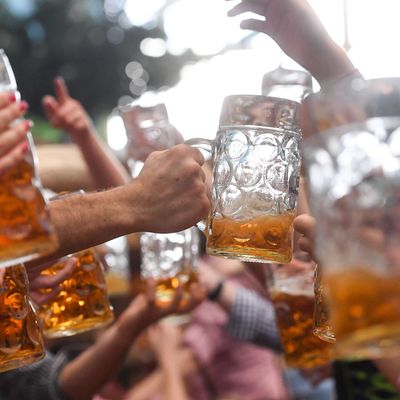
In running through various effects the GOP tax bill will have on regular people earlier today, I missed one item worth noting: It reduced federal excise taxes on alcoholic beverages. Beer — and particularly smaller breweries — got a nice boost, according to the Washington Examiner:
The Craft Beverage Modernization and Tax Reform Act, included in the Republican tax bill, lowers the federal excise tax on beer from $7 to $3.50 per barrel on the first 60,000 barrels for brewers producing less than 2 million barrels per year through 2019.
Wine wasn’t ignored, either:
According to the Wine Institute, the legislation allows wineries to claim a credit of between $.535 and $1 per gallon on the first 750,000 gallons of production, allows sparkling wine to qualify for the credit for the first time, increases the Alcohol by Volume allowed for lower tax rates, and increases the carbonation allowed in certain low alcohol wines for the lower tax rate.
And a drop of the hard stuff will probably get cheaper, too:
The Distilled Spirits Council, which represents “producers and marketers of distilled spirits in the United States,” issued a press release saying the legislation “reduces the federal excise tax on distilled spirits producers for the first time since the Civil War, which will enable the more than 1,300 operating distilleries nationwide to re-invest in their businesses and stimulate job growth in their communities,” and “creates a more equitable tax structure for distillers, brewers, winemakers and importers of beverage alcohol by equalizing the federal excise tax on spirits, beer and wine for the first 100,000 proof gallons.”
First time the federal hooch tax has been lowered since the Civil War! That’s historic, all right; wonder if that will make it into the GOP’s talking points on the bill.
Amidst the appropriately lubricated celebrations, of course, there will be spoilsports who point out that cheaper booze is not an unalloyed benefit for the nation. Brookings Institution economist Adam Looney soberly assesses the damage increased alcohol consumption could cause:
I estimate the legislation will cause between 280 and 660 additional motor vehicle deaths a year and approximately 1,550 total alcohol-related deaths annually from all causes …
Of course, the economic costs associated with alcohol extend well beyond deaths and include alcohol-related injuries, crime, domestic violence, alcohol-related disease, and associated costs to families and local law-enforcement and health-providers.
Looney also points out the small-producer advertising for these excise tax cuts is misleading, since the lower rates for a limited amount of volume are available to most producers, which also adds a new element of complexity into enforcement of the rules. All in all, the tax bill is moving in the opposite direction the evidence suggests:
Based on economic evidence of the negative externalities imposed by alcohol, the total local, state and federal tax on alcohol should be roughly four times higher than it is now, and certainly not lower.
But hey, everybody hates taxes, and why should this industry be cut out of the logrolling big barbecue of a bill that is largely based on the idea that tax cuts pay for themselves?
And if you disagree, or are among those who will be hit hard by other features of this bill, it won’t cost as much to cry into your beer over it.






























